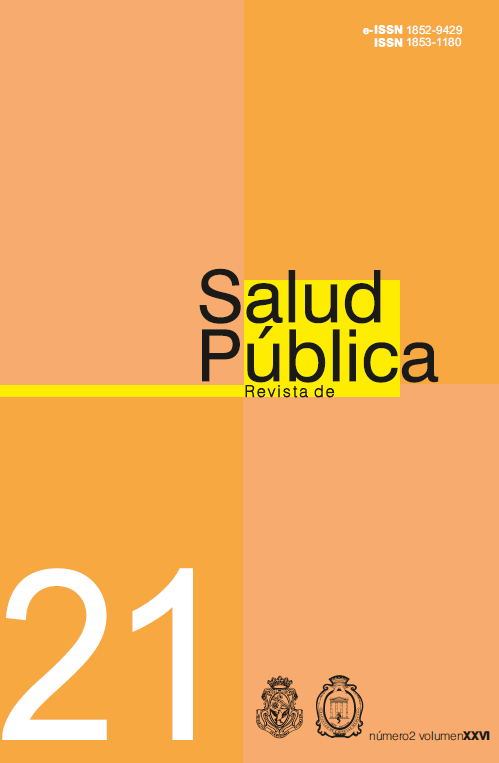the SOCIAL CONSTRUCTION OF SUPPLEMENTATION WITH MULTIMICRONUTRIENTS IN MOTHER´S CHILDS OF THREE YEARS
DOI:
https://doi.org/10.31052/1853.1180.v26.n2.27922Keywords:
community health nursing, micronutrients, infant nutritionAbstract
This research aims to analyze the social construction of the phenomenon of multimicronutrient supplementation (MMN) "sparks", considered as one of the main preventive-promotional nursing activities. The study is of a qualitative nature, where open interviews were conducted with mothers attending the health establishment of “Huacrapuquio”, Peru, in order to identify barriers and potentialities in supplementation according to the categories: intra / interindividual, institutional and communal. When performing the content analysis with the Atlas Ti v 7.6 software. The following results were evidenced: denial of supplementation in mothers due to the side effects of the supplements, the ineffective response of the nurse and the health system to side effects, the centrality of the health system in the fulfillment of indicators or goals, as a percentage of children receiving multimicronutrients without effective monitoring; This presence of negative opinions of the community becomes a strong barrier to the adherence of micronutrients. It is proposed to make health policies more flexible, in order to make cultural adjustments and / or personal choices for the best adherence to these supplements.
Downloads
References
1. Alcázar L. Impacto económico de la anemia en el Perú [Internet]. Diciembre. 2012. 9-71 p. Recuperado de: http://dide.minedu.gob.pe/xmlui/handle/123456789/1565
2. Ministerio de Salud (MINSA). Documento Técnico: Plan Nacional para la Reducción y Control de la Anemia Materno Infantil y la Desnutrición Crónica Infantil en el Perú 2017-2021. Ministerio de Salud, Perú; 2017.
3. Primera Infancia: Una mirada desde la Neuroeducación. Organización de los Estados Americanos OEA; 2010. 75 p.
4. Pérez Borda M. La paradoja de la malnutrición. Salud Uninorte. 2007;23(2):276–91.
5. Dolores-Maldonado G, Liria-Dominguez R, Espinoza-Bernardo S. Satisfacción materna de la consejería en suplementación infantil con hierro realizada por el personal de salud. An la Fac Med [Internet]. UNMSM. Facultad de Medicina; 7 de junho de 2018 [citado 30 de janeiro de 2020];79(1):29. Recuperado de: http://revistasinvestigacion.unmsm.edu.pe/index.php/anales/article/view/14589
6. Cafer JR. Representações sociais sobre amamentação na perspectiva de mães adolescentes com sintomas de depressão pós-parto. 2016.
7. Oliveira MSBS De. Representações sociais e sociedades: a contribuição de Serge Moscovici. Rev Bras Ciências Sociais. 2004;19(55):180–6.
8. MINSA. Norma técnica para el manejo terapéutico y preventivo de la anemia en niños, adolescentes y mujeres gestantes y puérperas [Internet]. 2017. p. 37. Recuperado de: ftp://ftp2.minsa.gob.pe/normaslegales/2017/RM_250-2017-MINSA.PDF
9. Oliveira AC de. Alteridade e Identidade: “Quem somos”, “Quem somos” nas vivências de processos migratórios. In: Diálogos Interculturais: reflexões interdisciplinares e intervenções psicossociais. São Paulo: IEA-USP; 2013. p. 85–107.
10. Mayca-Pérez J, Medina-Ibañez A, Velásquez-Hurtado JE, Llanos-Zavalaga LF. Social representations related to anemia in children under three years in awajún and wampis communities of Peru [Representaciones sociales relacionadas a la anemia en niños menores de tres años en comunidades awajún y wampis, Perú]. Rev Peru Med Exp Salud Publica [Internet]. 2017;34(3):414–22. Recuperado de: https://www.scopus.com/inward/record.uri?eid=2-s2.0-85037613759&doi=10.17843%2Frpmesp.2017.343.2870&partnerID=40&md5=f4c7c5ce0aeb7c1584c0961230ae159a
11. Jodelet D. Pensamiento social e historicidad. Relaciones. Estudios de historia y sociedad. Mexico. 2003. 26(93). Disponible en: https://es.scribd.com/doc/275959381/Pensamiento-Social-e-Historicidad-Jodelet
Downloads
Published
Issue
Section
License
Copyright (c) 2021 Escuela de Salud Pública y Ambiente. Facultad de Ciencias Médicas. Universidad Nacional de Córdoba

This work is licensed under a Creative Commons Attribution-NonCommercial 4.0 International License.
Authors who publish with this journal agree to the following terms:
- Authors retain copyright and grant the journal right of first publication with the work simultaneously licensed under a Creative Commons Attribution License which allows the work to be copied, distributed, exhibited and interpreted as long as it is not done for commercial purposes.
- Authors are able to enter into separate, additional contractual arrangements for the non-exclusive distribution of the journal's published version of the work (e.g., post it to an institutional repository or publish it in a book), with an acknowledgement of its initial publication in this journal.
- Authors are permitted and encouraged to post their work online (e.g., in institutional repositories or on their website) after the publication process. (See The Effect of Open Access). (See The Effect of Open Access).







